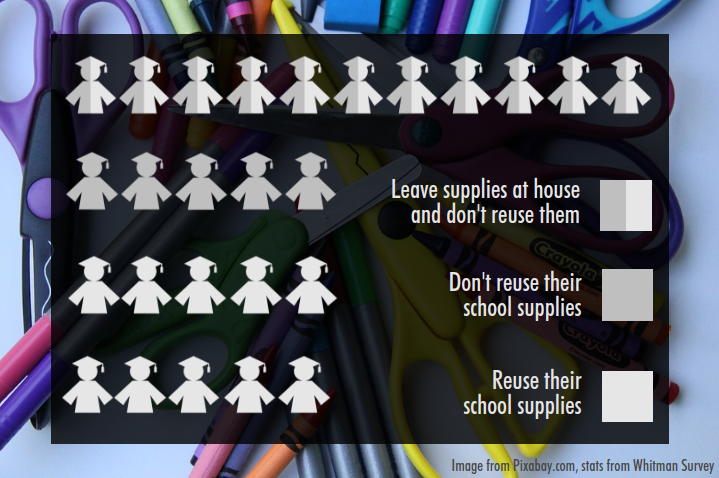Reuse school supplies; don’t buy
October 15, 2018
For many students, when the start of school creeps up at the end of August, it’s time for the ritual Target run. I walk into that familiar store, grab a red shopping cart—which always seems to have a broken wheel—and go to the school supply section. There I fill my cart with heaps of supplies: untouched erasers, boxes and boxes of pencils and, my personal favorite, a new pack of pens in every color.
But this year, I gave up my precious trip to the red bullseye in favor of reusing my old supplies. Instead of buying new items, I kept my backpack from the previous year, recycled the papers in my folders and washed out my old pencil case. I only ended up buying a box of pencils and some notebooks, because last year’s were filled.
I assumed I would end up back at Target after school on the first day, scrambling to buy whatever I had forgotten. But that never happened. I didn’t need a new pack of 20 pens or highlighters in every color. It was actually much easier to start my school year without the hassle of buying everything new.
Beyond convenience, it was gratifying to know that I was helping the environment. In 2015, Americans alone generated 262.4 million tons of waste, and the average person generates 4.4 pounds of trash every day, according to an EPA report. Items we use in school make up a surprising chunk: Americans throw away 1.6 billion pens each year, according to Force Change. Think about how much less waste there would be if everyone only bought school supplies that they absolutely needed.
Yet most of us don’t think to—or bother to—reuse. Instead, we tend to prize our shiny new belongings. In an informal lunchtime survey of 25 students, 60 percent of respondents said they don’t reuse school supplies.
Even if you’re someone who needs a crisp, new notebook, there are easy ways to ensure your old supplies go to good use. TerraCycle, an online company that sells recyclable school supplies, will buy your old materials, recycle or compost them and create plastic products.
There’s a lot of mindless consumerism at Whitman, and come August this translates into loads of new and unnecessary school supplies. This mindset creates unnecessary waste and negatively impacts the environment. Target may be fun, but our environment can’t wait.











